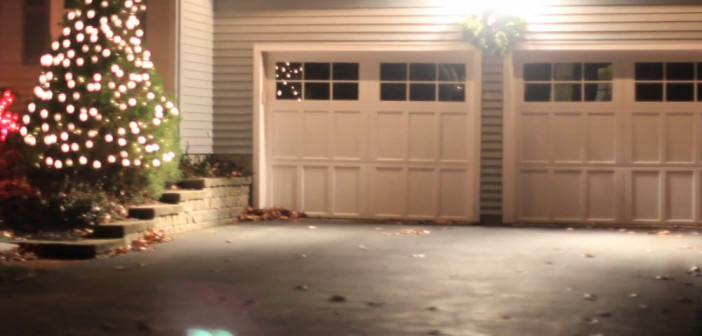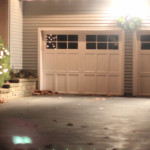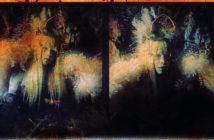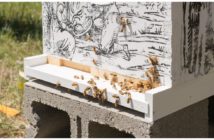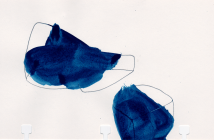I’m not really sure where to begin here. At certain times our personal lives drag us far away from the desire to make art, or even to talk about art. But I guess if I am going to write anything, I have to begin with stating the only thing that is on my mind right now, which is that my father, whom I loved dearly, died this weekend.
I have no real desire to say anything more than that simple statement of fact, but I do feel compelled to say it over and over again. I felt the need to utter it when I woke up this morning alone in a room in my parents' house, I nearly blurted it out when I eventually got myself out of the house and purchased decongestant at CVS to fight off the cold that’s been lingering since New Year's. I finally did get a chance to say it out loud, although not to my own species. I came home and saw Hooper, our cat, lounging in a spot of sun on my mom’s chair in the living room, and I told him. He opened his eyes and looked at me, but there was no deep inter-species moment of communication here. He stared at me blankly, mostly annoyed that I woke him up, and eventually sauntered away.
So here I am, putting down these words, contemplating publishing them on the internet for all the world to see. I have not picked up a camera or grabbed for my audio recorder since I stepped foot in this house, nor will I in the next couple of days. The idea right now is repugnant to me. I also have no desire to write about the details of the last few days, or my feelings about all this, or even my memories of my father. I do not want to share them, at least not yet.
Last Spring, I went to see Etgar Keret give a reading at a bookstore in Brooklyn. He read What Animal Are You? a story from his collection Suddenly a Knock on the Door. In the story a German Public Television crew comes to his house. They ask him to sit down and write for the camera, to really "write," so that they can dramatize his writing process and broadcast it for public consumption. At this point, the story reads as a straightforward critique of mass media, of the public’s voracious appetite for the sentimental and the personal, and the news media’s willingness to capitalize on this demand at whatever cost. However, in the story, he performs for the camera fairly well. He writes of his recently widowed upstairs neighbor, who has young women, probably prostitutes, visiting at all hours. He writes of his wife’s disdain for these women, and notes that she calls them whores, and that when she says "’whores" it said in the same manner she would say "turnip" . And he also write that his son loves the whores. His son sits in the hallways and gets them to play a game with him "What animal are you?" he asks them when he bumps into them on the stairs… and they get it right away, and throw out the name of an animal: an elephant, a bear, a butterfly"1.
In discussing this story at the reading last Spring, Keret noted that it’s the kind of story that folds in on itself. The initial disdain for the German Public Television crew is turned inwards towards himself, as he, by writing, exposes his wife and child. He not only complies with the crew, but actively takes part in turning the private into the public, the intimate into the strange, something which as a writer is familiar to him. His son, also, is in on the game, as he willingly hugs his father in front of the camera, and engages in his harmless, almost kind, fantasy game with the women in the hallway. Keret’s wife, however, does not comply with either the television crew or with her son’s game. She resists the disingenuous, but rather than being vindicated by the story she comes off as harsh, unbending, and well basically...not that much fun.
Anyways, what’s interesting is that Keret stated that the story was about making a connection between writing and documentary by showing that both involve a loss of intimacy. They both serve as a kind of release, but they also make everything feel a step away from itself. Since both revolve around narrative, and narrative revolves around plot, both are an attempt to understand the past in order to comprehend the future. They are an expression of a kind of yearning, and yearning is connected to the past and to the future, but not to the now, not to the concrete.
Right now things are pretty quiet at my parents' house. There isn’t a lot of talking. Well there is some, but it is mostly infused with gallows humor. It sputters out from one of us often, deflating something oppressive residing in this house. I think that writing this essay is a step away from the intimate, and these jokes we've been making are also a step away from the intimate, but they both feel like they cling to the present in a way that at this moment feels bearable.
I think humor can function in a lot of different ways, it can be both destructive and regenerative, but it’s undoubtedly what you do when your back is against the wall. I’ve always liked the following quote from Bakhtin's The Dialogic Imagination:
"Laughter…began to investigate man freely and familiarly, to turn him inside out, expose the disparity between his surface and his center, between his potential and his reality. A dynamic authenticity was introduced into the image of man, dynamics of inconsistency and tension between various factors of his image; man ceased to coincide with himself, and consequently man ceased to be exhausted by the plots that contained him.2"
My father was no stranger to humor. He was also no stranger to storytelling. I think the time for artifice and for taking the liberty to cast my father in any number of roles will come. Humor and storytelling might be escape, but I would also argue that they are the whole point. It's just going to take a while.
- Siobhan Landry, now they have it, Video, 2012.
[1] Keret, Edgar. "What Animal Are You?" Suddenly, a Knock on the Door. Published in the US by Farrar, Strauss and Giroux 2012.
[2] M.M Bakhtin. The Dialogic Imagination: Four Essays. University of Texas Press Slavic Series. Published in the US in 1982.

